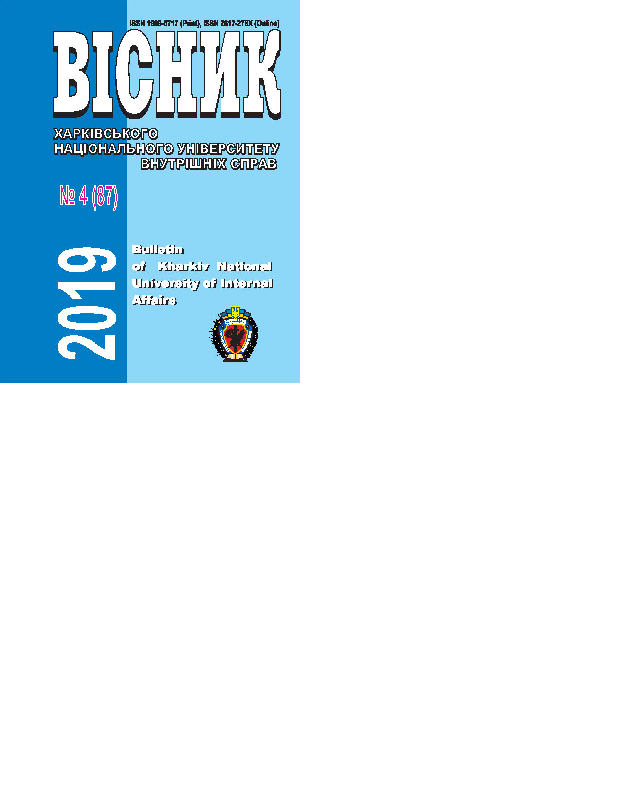Place of Executive Authorities in the Realization of the Right to Freedom of Peaceful Assembly
DOI:
https://doi.org/10.32631/v.2019.4.14Keywords:
the right to freedom of peaceful assembly, the notification of the intention to exercise the right to freedom of peaceful assembly, objects of notification, executive authorities.Abstract
The issue of realizing the right to freedom of peaceful assembly is one of the most pressing and problematic issues in the development of democratic relations in society. Since the realization of the right to freedom of peaceful assembly implies that the subject of realizing this right has a duty to notify, the purpose of this article is to determine the place of executive authorities while notifying the intention to the realization of the right to freedom of peaceful assembly.
The scientific novelty consists in the fact that the article describes the executive agency as the object of notification of the intention to realize the right to freedom of peaceful assembly and the legal regulation of this object in obtaining such notice. In particular, the legal regulation of the powers of executive authorities, as objects of notification of the intention to realize the right to freedom of peaceful assembly and the legislative regulation of the latter to be such objects.
The current national legislation of Ukraine does not contain norms that would directly determine the executive authorities as objects of notification of the intention to realize the right to freedom of peaceful assembly. The existing legislative provisions on the object of the notification determine the object in general, using an alternative way of presenting the norm, which does not contribute to legal certainty and predictability. At the same time, this state of affairs, with the definition of the executive authorities as the object of notification, makes it impossible for the timely and complete fulfillment of the obligation of the holder of the right to freedom of peaceful assembly, which may lead to unjustified application of legal liability measures.
Downloads
References
Kurakin O.M. and Romanov M.Yu., 2016. Right of peaceful assemblies: from authoritarianism to democracy [Pravo na myrni zibrannia: vid avtorytaryzmu do demokratii]. Naukovij vìsnik Hersonsʹkogo deržavnogo unìversitetu. Serìâ Ûridičnì nauki – Scientific Herald of Kherson State University, No. 1, pp. 39-42.
Shcherbaniuk O.V., 2013. Peaceful collections as form of direct realization by the people of sovereign power [Myrni zibrannia yak forma bezposerednoho zdiisnennia narodom suverennoi vlady]. Porìvnâlʹno-analìtične pravo, No. 3, pp. 104-108.
Khramova T.M., 2015. Limitations of constitutional freedom of collections: comparatively-legal analysis [Ogranicheniya konstitutsionnoi svobody sobranii: sravnitel`no-pravovoi analiz]. Ph.D. dissertation. National Research University "High School of Economics".
Polyanskaya I.S., 2005. Constitutionally-legal adjusting of right for the citizens of Russian Federation on holding meeting, mass meeting and demonstrations, processions and picketing [Konstitutsionno-pravovoe regulirovanie prava grazhdan Rossiiskoi Federatsii na provedenie sobranii, mitingov i demonstratsii, shestvii i pekitirovaniya]. Abstract of Ph.D. dissertation. Moscow University of the Ministry of Internal Affairs of Russia.
Luchenko D., 2018. Electronic petition as a form of appeal against decisions, actions or inactivity of public authorities [Eletktronna petytsiia yak forma oskarzhennia rishen, dii abo bezdiialnosti subiektiv publichnoi vlady]. Pravo Ukraïni – Law of Ukraine, No. 11, pp. 53-64.
Davydova V.A., 2018. Organization support for delegation of authority in the system of local self-government in Ukraine [Orhanizatsiine zabezpechennia delehuvannia povnovazhen u systemi mistsevoho samovriaduvannia v Ukraini]. Naukovì zapiski Ìnstitutu zakonodavstva Verhovnoï Radi Ukraïni – Scientific Papers of the Legislation Institute of the Verkhovna Rada of Ukraine, No. 1, pp. 69-76.
Kurakin A.V., Kostennikov M.V., Tregubova E.V., 2013. Constitutional right to hold peaceful assemblies, rallies, demonstrations, processions and picketing and administrative liability as a means of ensuring it [Konstitutsionnoe pravo na provedenie mirnykh sobranii, mitingov, demonstratsii, shestvii i piketirovaniya i administrativnaya otvetstvennost` kak sredstvo ego obespecheniya]. Pravo i politika, No. 13, pp. 1804-1812.
Foster S., 2016. Freedom of Religion, Association, and Peaceful Assembly. Concentrate Questions and Answers Human Rights and Civil Liberties: Law Q&A Revision and Study Guide. Oxford: Oxford University Press. DOI: https://doi.org/10.1093/he/9780198745174.001.0001.
Peters A. and Ley I., 2016. The Freedom of Peaceful Assembly in Europe. Baden-Baden: Nomos; Oxford: Hart Publishing. DOI: https://doi.org/10.5040/9781509913220.
Vitruk N.V., 2008. General theory of legal position of personality [Obshchaya teoriya pravovogo polozheniya lichnosti]. Moscow: Norma.
Bek Yu.B., Bohdan I.H., Hryhorovska L.V. et al., 2004. Scientific and practical comment of the Civil code of Ukraine [Naukovo-praktychnyi komentar Tsyvilnoho kodeksu Ukrainy]. Kyiv: Istyna. (Ed. Kossak V.M.).
Object [obiekt]. [online] Wikipedia. Available at https://uk.wikipedia.org/wiki/Об%27єкт [Accessed 9 December 2019].
Object [obiekt]. [online] Dictionary of the Ukrainian language. Available at http://sum.in.ua/s/ob.jekt [Accessed 9 December 2019].
Rabynovych P.M., 1999. State power [Derzhavna vlada]. In: Shemshuchenko Yu.S. (ed.) et al. Legal encyclopedia [Yurydychna entsyklopediia]: in 6 vols. Vol. 2. Kyiv: Ukrainska entsyklopediia. Pp. 85-86.
Bytiak Yu.P., Bohutskii V.V., Harashchuk V.M. et al., 2001. Administrative law of Ukraine [Administratyvne pravo Ukrainy]. Kharkiv: Pravo (Ed.: Bytiak Yu.P.).
Kryvoruchko V., 2018. Organs of executive power as subjects of administrative management [Orhany vykonavchoi vlady yak subiekty administratyvnoho upravlinnia]. Pìdpriêmnictvo, gospodarstvo ì pravo – Entrepreneurship, Economy and Law, No. 3, pp. 95-99.



